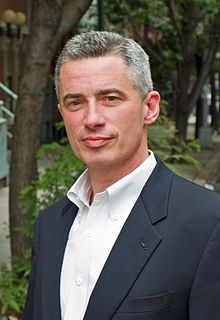A Quote by Arthur Schopenhauer
Our first ideas of life are generally taken from fiction rather than fact.
Related Quotes
We sometimes drive ourselves crazy with how our books will be "seen," when in fact we already know what they're about, and where our obsessions are. If we can spin those obsessions into fiction, then there's a decent chance they will be "fiction-worthy," as you call it. The idea of the "sweep of ideas" is a complicated one.
Santa Monica Bay is less polluted today than when I first moved to the area in the 1970s, because actions have been taken to avoid putting some of the noxious materials into the sea. I think people are more aware than they once were, the air is cleaner, water generally is, in spite of the fact that there are more people.
As an educator, I try to get people to be fundamentally curious and to question ideas that they might have or that are shared by others. In that state of mind, they have earned a kind of inoculation against the fuzzy thinking of these weird ideas floating around out there. So rather than correct the weird ideas, I would rather them to know how to think in the first place. Then they can correct the weird idea themselves.
My third maxim was to try always to conquer myself rather than fortune, and to change my desires rather than the order of the world, and generally to accustom myself to believing that there is nothing entirely in our power except our thoughts, so that after we have done our best regarding things external to us, everything in which we do not succeed is for us absolutely impossible.
If I as a geologist were called upon to explain briefly our modern ideas of the origin of the earth and the development of life on it to a simple, pas- toral people, such as the tribes to whom the Book of Genesis was addressed, I could hardly do better than follow rather closely much of the language of the first chapter of Genesis.
Physics has entered a remarkable era. Ideas that were once the realm of science fiction are now entering our theoretical ? and maybe even experimental ? grasp. Brand-new theoretical discoveries about extra dimensions have irreversibly changed how particle physicists, astrophysicists, and cosmologists now think about the world. The sheer number and pace of discoveries tells us that we've most likely only scratched the surface of the wondrous possibilities that lie in store. Ideas have taken on a life of their own.










































